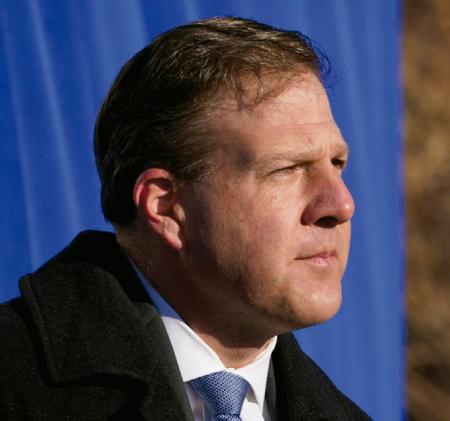Doing a number on school vouchers
Maybe the folks over at the Josiah Bartlett Center should get a new calculator.
The Concord-based “free market think tank” released an analysis earlier this month of SB 130, the bill that would essentially give NH the most wide-ranging (read expensive) school voucher program in the US of A.
To refresh: The bill would create “Education Freedom Accounts” that would give money to any NH resident with public schooleligible kid(s) to instead pay for “a variety of educational services chosen from a state-approved list.” In other words. take money dedicated to public schools and ship it over to private schools and to subsidize folks choosing to home-school their kids.
Now, advocates for the program have downplayed the cost from the get-go, insisting in the analysis that the program’s price tag would be $2.47m in 2021-22 and $6.14m in 2022-23. Not the biggest chunk of change, right?

Well, kinda yeah. Because the analysis has a wee error in its math, as you can see on page 55, where author Ben Scafidi (an economics prof at Kennesaw State University in Ga.) explains his projections based on how Indiana fared through its (more modest) voucher program:
“Based on this Indiana experience, I project that 11% of eligible private school students will access an EFA in 2021-22 (1,742 students). For 2022-23, usage rises to 26.4% (4,180 students). According to the NH DOE, the projected cost of an EFA is $4,603 in 2021-22 and $4,830 in 2022-23. Thus, the costs to the state of providing EFAs to private school students are estimated to be:
$2.47 million in 2021-22 $6.14 million in 2022-23.” OK now – the hard part: Using BS’ own numbers, if 1,742 students are tapping into 4,603 bucks apiece in 2021-22, that would mean — using public school-taught multiplication — $8.96m. And if 4,180 students are tapping into 4,830 bucks apiece in 2022- 23, that would be, er, $20.18m.
Now, using public school-taught subtraction, instead that means the actual costs are almost 6 and a half mill over the original ’21-22 projection and over 14 mill more than the original ’22-23 projection.
So, instead of 8 and a half mill over two years, the vouchers would cost almost 30 mill. Now that’s starting to sound like real money, ain’t it?
One other thing: No one in the Senate read through the report to check the math on P. 55 before giving their initial OK to SB130? Tsk tsk.

“You
really can’t expect a Zoom committee hearing to be as productive as one
that is held in person … There just isn’t the time to pore through all
of these issues.”
– Guv Sununu on the Legislature’s performance so far this session.
School of second thought
One other thing about that Josiah Bartlett Center school voucher analysis.
One of the most vocal, all-out cheerleaders for a voucher program in NH is nunuther than Andrew Cline, prez of the JBC.
Oh … and AC also just happens to be the chair of the NH Board of Ed.
And
the Board of Ed’s job is “to provide leadership, support, and oversight
of the state’s education system” according to its mission statement.
And that “leadership, support, and oversight” is given to the Dept. of Education.
Now,
the commish of the Dept. of Ed. is Frank Edelblut, perhaps a bigger,
more vocal, all-out cheerleader for school vouchers than AC.
So
when the ed commish is doing his all-out-cheerleading and citing the
JBC analysis as a trusted source for his info, it does kinda-sorta make
you wonder.
The state they’re in
It’s been an interesting coupla weeks for observers of the Free Staters who populate certain regions of NH.
That’s
because the feds have taken an interest in the financial goings-on in
one of the hotbeds of Free Staterism, (unfortunate for most of the
citizens there) Keene.
Earlier
this month, the FBI raided the home of Ian Freeman, leader of the “Free
Keene” movement and overall Free State provocateur. The home is
headquarters for IF’s Shire Free Church Monadnock, and IF, along with
five other people, were arrested in connection with a Bitcoindollar
exchange system.
The feds say the system involved a multimilliondollar money laundering scheme using Bitcoin ATMs and churches IF started.
Freeman: In FBI’s sights
Now,
about those ATMs: First, they’re actually called cryptocurrency vending
machines, or CVMS. There are three of them owned by Bitcoin Embassy NH,
which is based in Keene and is owned by Shire Free Church Holdings LLC,
according to Manchester Ink Link.
Bitcoin Embassy owned three of them, two in Keene and another at Murphy’s Taproom in Manch.
Just
by coincidence, Murphy’s is owned by Keith Murphy, a GOP state rep from
Bedford. Murphy’s investors include Dan (a former GOP state rep) and
Carol McGuire (who’s still a GOP state rep). KM, DM and CM all settled
in NH by way of the Free State Project back in the day.
MAKING THE ROUNDS
House
Speaker Sherm. Packard’s argument for eliminating remote House
committee meetings asap, via a NHPR interview: Asked about reps’ use of
profanity and derogatory language in remote hearings, he said: “This
kind of stuff never happened when we were meeting in person, and this
all happened with these Zoom meetings.”
As for all the talk about the guv running for Maggie Hassan’s Senate seat: Where there’s smoke there’s fire.
Just for the record:
The guv says if were a senator this go-round, he would have voted
against the $1.9t Covid relief bill. But it would be “foolish” to follow
Florida Sen. Rick Scott’s recommendation to GOP guvs to reject the
dough and sent it back to the feds. Got that?
Sure, legislators
have spent as much time kicking decisions down for the next session, or
later. So of course the NH Supreme Court followed suit with then ConVal
school funding case when it sent it back to a lower court to buy some
time.